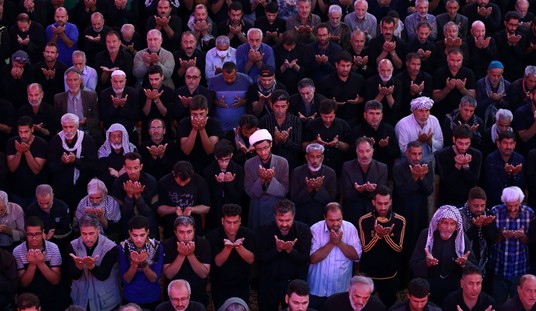It is customary to imagine the strong colonizing the weak, but history shows the weak colonize the strong all the time, provided they have a sufficient sense of entitlement. Joseph Conrad captured the paradox exactly in his description of the ship Patna as it sailed with 800 Muslim pilgrims across the Indian ocean to the Red Sea in his novel Lord Jim.
They streamed aboard over three gangways, they streamed in urged by faith and the hope of paradise, they streamed in with a continuous tramp and shuffle of bare feet, without a word, a murmur, or a look back … Eight hundred men and women with faith and hopes …
At the call of an idea they had left their forests, their clearings, the protection of their rulers, their prosperity, their poverty, the surroundings of their youth and the graves of their fathers. They came covered with dust, with sweat, with grime, with rags—the strong men at the head of family parties, the lean old men pressing forward without hope of return; young boys with fearless eyes glancing curiously, shy little girls with tumbled long hair; the timid women muffled up and clasping to their breasts, wrapped in loose ends of soiled head-cloths, their sleeping babies, the unconscious pilgrims of an exacting belief. …
Below the roof of awnings, surrendered to the wisdom of white men and to their courage, trusting the power of their unbelief and the iron shell of their fire-ship, the pilgrims of an exacting faith slept on mats, on blankets, on bare planks, on every deck, in all the dark corners, wrapped in dyed cloths, muffled in soiled rags, with their heads resting on small bundles, with their faces pressed to bent forearms: the men, the women, the children; the old with the young, the decrepit with the lusty—all equal before sleep, death’s brother.
The white men in the pilot-house, — the infidels — were of course less than nothing in the eyes of their passengers. Every man aboard was dependent on them, but there was nothing in the least incongruous to the 800 passengers about relying on the white man’s magic and fire-ship to cross the vast ocean. If any irony was at all apprehended it was dismissed in a moment. After all, the infidel was put there from on high to serve the believer and that was the end of it. The ship, its engines, its technology all wore the aspect of a magic lamp found in a cave to serve an expedient purpose.
That the weak can enslave the strong is proved by Cuba’s relationship to Venezuela. The Cuban economy is dwarfed by Venezuela’s. But it is Cuba that calls the shots. There are rumors that even now, the Cuban intelligence service is reinforcing Maduro’s to suppress the opposition. “The Venezuelan regime is a puppet controlled by the Cubans. … Mr. Maduro …promise[d] more Venezuelan handouts for Havana, which already amounted to about 130,000 barrels of oil a day.” Just as with the pilgrims the oil industry and associated engineering were a “stash” fortuitously placed before Castro for the taking.

Do you object?
Why don’t the people who make stuff stand up for their rights? How can they blithely concede whatever is asked of them? Easy. Recently someone asked me how it was possible for Islamic rebels in the Southern Philippines to demand yet another autonomous region, and even more money after stealing so much?
“Simple,” I answered. “They have the only thing that matters: entitlement and ruthlessness.” To illustrate the power of insistence I pointed out that the single greatest massacre of journalists in modern history took place in the province of Maguindanao, in Central Mindanao. The Committee to Protect Journalists (CPJ) based in New York City, “Journalism’s Red Cross” called the Maguindanao massacre “the deadliest single attack on the press ever documented by CPJ”. And I’ll bet few have even heard of it.
Fifty seven people, 37 of them journalists, four of them from UNTV were massacred in 2009 by men allegedly working for Andal Ampatuan, Jr, one of Mindanao’s leading Muslim politicians. He did it to so he could win an election against his rival. His men intercepted a convoy of civic leaders, journalists and local dignitaries and killed them all.
Five of the female victims, four of them journalists, were raped before being shot in the genitals. All the victims were buried together with their vehicles, by an excavator belonging to the provincial government, so that ultimately, the taxpayer even paid for it. The biggest mistake his victims made was to imagine their attackers would be deterred by some shared scruple or mutual sense of decency. Decency is for nations like Israel who worry about “public opinion” but not everyone is so fastiduous.
The victims died because they didn’t understand that some people are limited by nothing. They’re happy to watch the world burn and use you as fuel. You would think this massacre would guarantee bad press coverage. But maybe the opposite is true. Men like Ampatuan will get better coverage than ever because fear softens the pen of even the boldest writer.
The case is still pending before an appeals court because Ampatuan’s “rights” must be observed. He may even be ultimately acquitted on a technicality. The lawyers and procedures must be marvelous things to him, up there with the white man’s navigational magic and the fire ship. They might be incomprehensible to him but they are convenient, as the jetliners used to crash into the World Trade Center were convenient, things to be used without a thought because providence put them there for the enjoyment of the elect.
Deserving’s got very little to with who winds up with what in a jungle. And it’s no longer sensible to claim that it does.
Kevin Williamson at the National Review described the idea put forth by venture capitalist Tom Perkins, who argued that if liberals believed in progressive taxation — charging him a higher tax rate than others — then they had to correspondingly give him progressive influence. He imagined a sort of symmetry.
Today, he is once again being locked in the stocks of public opinion for suggesting, only partly tongue-in-cheek, that people who pay an enormously disproportionate share of the taxes should have a disproportionate say in public policy. “The Tom Perkins system is: You don’t get to vote unless you pay a dollar of taxes,” he said. “But what I really think is, it should be like a corporation. You pay a million dollars in taxes, you get a million votes. How’s that?”
Blasphemy, surely. But Williamson admits Perkins has a point. “But Mr. Perkins here has only taken a step that progressives took a few generations ago, when they embraced escalating rates of taxation as a foundation for economic justice, and applied it to a different problem. If our political liabilities — taxes — should be as a matter of justice proportional to our income, then why shouldn’t our political input be likewise proportionate? Why should proportionality be the rule in one context and not the other?”
Cass Sunstein ought to agree with Tom Perkins since he famously argued in the New York Times that “liberty depends on taxes”. If so then the providers of taxes are the fountain of all liberty. Therefore people who pay no taxes — invent no fire-ships — have no inherent right to the liberties Sunstein argues are purchased by the exactions of the IRS.
Surely I jest. Ha ha ha. Because in modern political theology the have-nots — let us not say the weak — deserve the fruits of the haves. All property is theft, as Proudhon put it. So the only point to economics is to be the last thief in the series. Cuba has a claim to oil because it needs it. The Muslim rebels in the Philippines deserve whatever they demand because they demand it. Illegal aliens deserve a job in America because politicians will give it to them. In general you have because you can get. There is no linkage between the making and the benefiting.
“From each according to his gullibility, to each according to his greed”. Isn’t that what Marx really meant ? Of course what he really said is: “from each according to his ability, to each according to his needs!” But he would say that, wouldn’t he?
Ironically the biggest losers in this clash of conceptions are those who naively think that because you worked for something then it belongs to you. Or those who imagine that simply because their country is theirs then it will remain theirs. They mirror-image their notion of fairness upon the world.
Nothing could be further from the truth. You have what you have because you can hold on to it. As to countries, there is no spot on earth that hasn’t been grabbed at least once from those who were there before them. The having is in the possessing. And Lord “Tuan” Jim, lost among his dividers and charts, ensconced atop his fire-ship and happy in the solitude of sea and sky may have forgotten the sad lesson of history: that those who want and are willing to take very often get away with it.
The imbalance will persist so long as arbitrage is possible between two modes of conduct. If we all agree to conduct ourselves according to Ampatuan’s lights his advantage would vanish as it would should he act like those who were killed. Choose: savagery or civilization. Alas they chose savagery and we choose civilization, surprised we are the worse for it.
At times peoples in their frustration level the playing field. War is when everyone plays by the same set of grim rules, because peace meant institutions living a lie. Whatever else war is, it is fair in its unfairness. History suggests we must choose what rules to live by and abide by them. Either that or all is fair. For a world divided cannot stand against itself. Either we all live like gentlemen or fall to like brutes.
Did you know that you can purchase some of these books and pamphlets by Richard Fernandez and share them with you friends? They will receive a link in their email and it will automatically give them access to a Kindle reader on their smartphone, computer or even as a web-readable document.
The War of the Words for $3.99, Understanding the crisis of the early 21st century in terms of information corruption in the financial, security and political spheres
Rebranding Christianity for $3.99, or why the truth shall make you free
The Three Conjectures at Amazon Kindle for $1.99, reflections on terrorism and the nuclear age
Storming the Castle at Amazon Kindle for $3.99, why government should get small
No Way In at Amazon Kindle $8.95, print $9.99. Fiction. A flight into peril, flashbacks to underground action.
Storm Over the South China Sea $0.99, how China is restarting history in the Pacific
Tip Jar or Subscribe or Unsubscribe










Join the conversation as a VIP Member